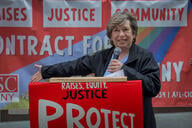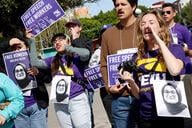You have /5 articles left.
Sign up for a free account or log in.
A mail-in election scheduled to begin this week to decide whether a group of adjuncts at Duquesne University could unionize was thrown into disarray Friday after university officials filed a motion with the National Labor Relations Board challenging its jurisdiction over the university because it is a Roman Catholic institution.
The action, which surprised adjuncts and United Steelworkers officials who are helping the organizing effort, came after the university agreed to an election to decide whether about 100 adjuncts at the university’s McAnulty College and Graduate School of Liberal Arts would unionize. A union official said that it would likely file a brief today to contest the university’s assertion, but it was unclear if and when the election would happen. “The regional office will move fairly quickly on this. As of right now, we don’t know what the outcome will be,” said Nancy Cleeland, a NLRB spokeswoman.
According to documents filed with the board, the university wants to withdraw from the election because Duquesne is a “church-operated school” as defined in a previous Supreme Court case and the NLRB has no jurisdiction over it. “Our Catholic identity is at the core of who we are and everything we do as an institution,” said Bridget Fare, a university spokeswoman, in an e-mailed message. The decision was an abrupt change in course for the university. Just last month, Fare said officials would not challenge the organizing effort.
The challenge is similar to arguments put forward in two other cases at Catholic institutions – Saint Xavier University and Manhattan College -- where adjuncts tried to unionize. In both cases, the NLRB ruled that the institutions are not so religious that they should get an automatic exemption, and that the work performed by adjuncts has little relationship to the universities' religious teachings. The rulings are currently under appeal.
Joshua Zelesnick, an adjunct who teaches English composition at Duquesne, said he was taken aback that the university signed an agreement to follow all NLRB rules and regulations and was now trying to back out of it. “They totally reneged on a promise they made to bargain with us in good faith. This doesn't seem like a very ‘religious’ thing to do,” he said.
“They have a history of bargaining with other unions on campus -- for instance: they're not too Catholic to bargain with the Teamsters, who represent the campus police; not too Catholic for other unions. How are they all of a sudden too Catholic for the USW?” Zelesnick said, adding that if the university wanted to exhibit its Catholic identity, “upholding the papal encyclicals would be a great place to start.”
Robin Sowards, an adjunct who teaches composition and linguistics at Duquesne, pointed out that the Roman Catholic Church has said that unions are an “indispensable element of social life.”
Jeff Cech, lead organizer for the United Steelworkers in the Duquesne campaign, said that the Adjuncts Association will hold firm. “This is a complete change in the conversation. These adjuncts deserve fair wages and job security,” Cech said. “I don’t think this should be a valid challenge.”




